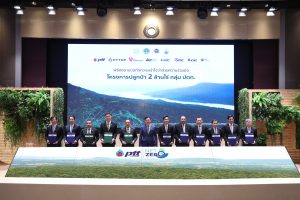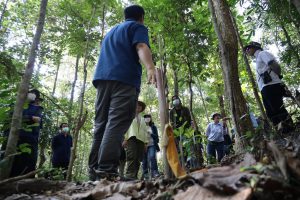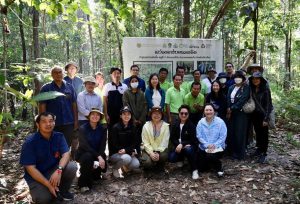Biodiversity
“IRPC is committed to integrating biodiversity considerations into our business decision process in order to avoid and minimize risks and impacts to sensitive biological values.”
Commitment:No net deforestation |
|
100% of IRPC operational sites assessed for biodiversity risk. |
100% of IRPC operational sites assessed for biodiversity risk. |
Stakeholder Impact
Biodiversity is essential for the ecological processes that sustain various aspects of human life. The recent decline in biodiversity poses a significant threat to the stability and resilience of ecosystems, jeopardizing the availability of resources, from food and clean water to the cultural and recreational services that contribute to our overall well-being. Recognizing our business’s impacts on the environment, including biodiversity and ecosystem services, as well as reliance on biodiversity and ecosystem services to support our business from our upstream energy business to our downstream distribution and retail businesses, IRPC places great importance on protecting and managing biodiversity throughout our value chain to support IRPC’s long term business success and safeguard the environment and the well-being of current and future generations.
At IRPC, we prioritize the safety and well-being of people and the environment as integral to our core values. IRPC and subsidiaries are committed to integrating biodiversity considerations into our business decision process in order to avoid and minimize risks and impacts to sensitive biological values. Biodiversity is also a part of IRPC’s due diligence in supporting sustainable development in economic, environmental, and social aspects.
Management Approach
IRPC’s commitment to biodiversity protection is embedded at the highest level of our corporate policy through the Quality, Security, Safety, Occupational Health, Environment, and Energy Management Policy (QSSHE) policy, which incorporates biodiversity management as a critical component of reducing our environmental footprint by:
- Designing and managing our facilities to avoid and mitigate against adverse impacts on biodiversity values;
- Operating our facilities responsibly, especially in areas with sensitive biodiversity values; and
- Determining to ‘No Net deforestation’; the future reforestation to compensate, where possible, the current forest loss or future implementation
This commitment also extends to IRPC’s key stakeholders, including Tier-1 and Non-tier 1 suppliers.
IRPC Biodiversity Policy [link]
IRPC Climate Change Policy [Link]
IRPC QSSHE Policy [link]
IRPC’s approach to biodiversity management involves managing biodiversity in areas with sensitive biodiversity values or nearby in accordance with relevant regulations and standards, implementing operating practices/procedures to prevent and mitigate biodiversity loss, and avoiding operations in World Heritage sites and IUCN Category I-IV protected areas. To translate our commitment into actions, IRPC and subsidiaries aim to implement the following actions across our operations:
- Assessing the potential risk and impact of our activities on biodiversity values;
- Conducting our operations responsibly in all areas, including environments with sensitive biodiversity values;
- Identifying actions to avoid and mitigate against adverse impacts to biodiversity values;
- Applying the “mitigation hierarchy” in a step by step process by avoiding impacts on high biodiversity values; mitigating any impacts by improving biodiversity values and consider offsetting any residual losses;
- Seeking ways to make positive contributions to biodiversity conservation;
- Integrating the identification, evaluation, management and monitoring of biodiversity values into our Due Diligence; Environmental Impact Assessment; and Risk Management processes;
- Engaging communities and key stakeholders to enhance biodiversity outcomes through consultation, constructive relationships, and partnerships; and
- Communicating our biodiversity-related activities to local communities, employees and the public.
IRPC also assesses our performance on biodiversity and ecosystem services management to ensure effectiveness of our actions by:
- Measuring the risk that our operations pose to biodiversity values;
- Regularly monitoring biodiversity values where we are required to do so; and
- Regularly auditing our performance against our values and actions to ensure that we operate effectively.
Findings and insights from these performance assessments will guide future actions for improved biodiversity management performance.
Implementation
Biodiversity Risk Assessment
IRPC conducts a biodiversity assessment to evaluate the potential impacts of our activities on the local biodiversity using GRI standards EN 11 and EN12 methods to collect data and describe sources related to Biodiversity and Ecosystem Services (BES). The process includes integrating risk assessment and revising biodiversity data to develop a targeted action plan, particularly for high-risk areas. The assessment results for all operational sites (100%) in 2023 indicate no site with significant biodiversity impacts.
More details of IRPC Biodiversity Risk Assessment Method [link]
Biodiversity Programs
For many years, IRPC has actively engaged in numerous projects dedicated to the conservation and rehabilitation of biodiversity, contributing significantly to environmental well-being. Some of the highlighted projects and our notable achievements include:
| IRPC joins collaborates with the PTT Group to accelerate reforestation, aiming to lead the country towards Net Zero.
IRPC along with other PTT Group subsidiaries have signed three Memoranda of Understanding (MOUs), involving the development of areas for planting, maintaining, and managing forest ecosystems in collaboration with the Royal Forest Department, the development of areas for planting, maintaining, and managing forest ecosystems with the Department of National Parks, Wildlife, and Plant Conservation, and the planting and maintenance of mangrove forests for carbon credit benefits with the Department of Marine and Coastal Resources. The target is to achieve Net Zero Emissions by planting 2 million acres, with 1 million acres by PTT and another 1 million acres in collaboration with PTT Group subsidiaries by 2030.
|
Forestation Project Partnership with Mae Fah Luang Foundation (MFLF)
|
Performance Summary
| Number of sites | Areas (Hectares) | |
| Overall | 30 | 701.28 |
| Assessment | 30 | 701.28 |
| Exposure | 0 | 0 |
| Management plan | 0 | 0 |
| Report IUCN Red List species and species on the national conservation list that is affected by business operations | 0 | 0 |



 Live Stream
Live Stream


